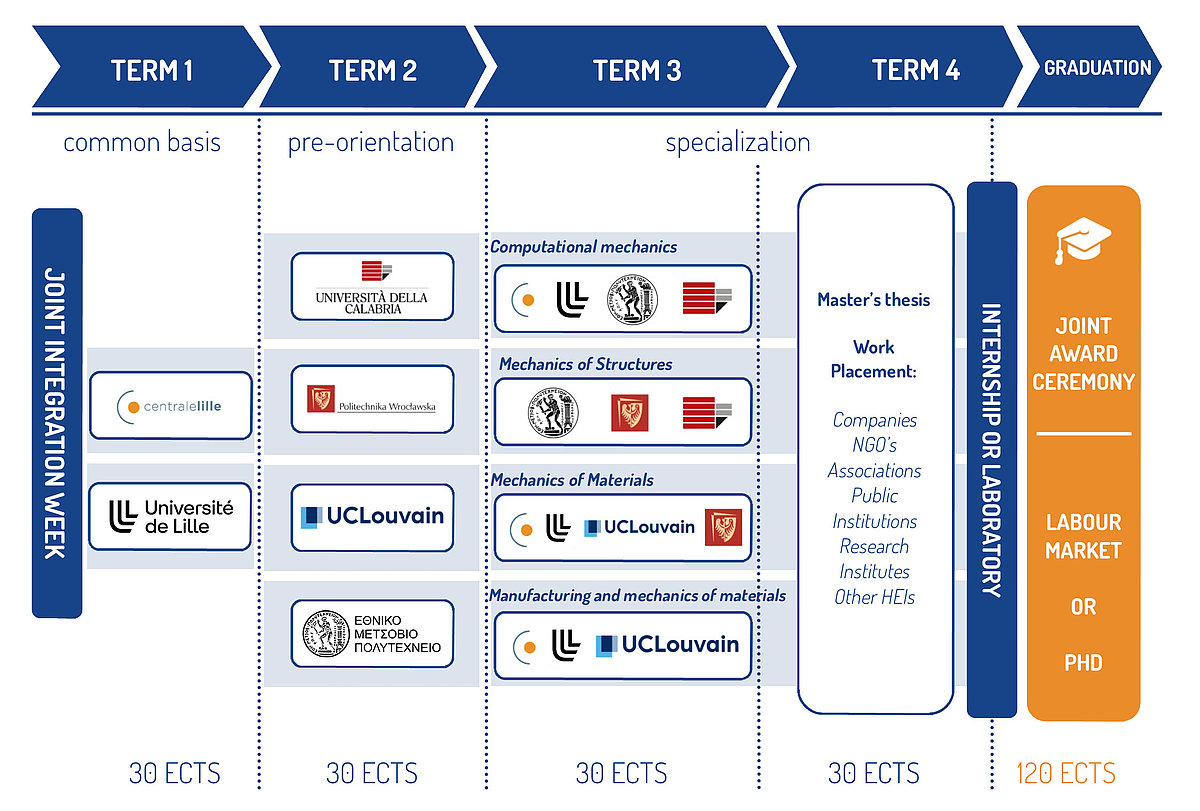sur bandeau ligne 2
ABOUT THE STRAINS MASTER PROGRAMME

The educational aim of the programme is to qualify students to a level of excellence in one of the 4 specialised fields of Mechanics:
- Computational Mechanics
- Mechanics of Structures
- Mechanics of Materials
- Material Design & Properties
This 2-year study program of excellence, leading to 120 credit Master’s diplomas was designed to meet the renewed international demand for qualified graduates with dedicated training and experience in fundamental and advanced mechanics.
The programme offers mobility across 5 European sites with the objective for the student to do at least 2 or 3 mobilities within its course.
The programme courses are taught in English at all partner institutions and are structured according to the following scheme.
MOBILITIES

DISCLAIMER: Mobilities wishes are not to be taken for granted: they have to be validated by the STRAINS Academic Board first.
Each semester, there will be a limited number of available spots in each institution. This number varies every year, depending on the number of selected students.
Students will be asked to make three mobility wishes (in order of preference) before every semester. The wishes will be presented to the Board and the final decision will be made based on the students' wishes, the number of students required in each STRAINS institution and the student ranking (based on the grades obtained in previous semesters).
Erasmus Mundus scholarship holders must do mobilities in at least two of the Programme Countries represented in the consortium (different from their country of residence).
SEMESTER 1 - COMMON BASIS (30 ECTS)
All students will be welcomed in Lille and will participate in integration events, including compulsory workshops (including seminar by guest speakers).
The goal of this first term is to provide a strong fundamental background in Solid Mechanics to strengthen students background to the level required and to enable them to reach a similar level of knowledge before tackling more specialized or applied topics at partner institutions.
SEMESTER 2 - PRE-ORIENTATION (30 ECTS)

In the second semester, the students have a choice between 4 campuses.
The second semester gives a first thematic orientation to the student path.
- At UCLouvain (Belgium), the courses allow the students to acquire a pervasive knowledge of the mechanics of materials and related manufacturing technologies in the range of Mechanical engineering.
- At WUST (Poland), the concepts and methods are taught at such a level of abstraction that the application spectrum is wide and can engage students interested in Mechanical engineering or in Civil engineering.
- At NTUA (Greece), the courses are designed so that they may be followed by either a Civil or a Mechanical Engineer, with some of the courses being of common interest to both disciplines
- At UNICAL (Italy), the orientation is clearly oriented towards Civil engineering, although numerical methods are taught at a high level of generality and many acquired tools in these courses can also be used in Mechanical engineering.
SEMESTER 3 - SPECIALISATION (30 ECTS)

In the third semester, students have a choice between all 5 campuses.
• In the third semester, students can follow courses in any of the institutions of the consortium.
• They can study outside of the chosen specialization with the agreement of the Academic Board.
SEMESTER 4 - MASTER THESIS / INTERNSHIP (30 ECTS)
Students have a choice between a master thesis or internship. A master thesis can take place at the institutions of the STRAINS consortium. Internships can be done anywhere: in an industrial or applied research environment, a research laboratory of a partner university on a joint topic or in an associate partner organisation or any other company, NGO’s, etc.
Every year, the consortium sends the second-year students a list of master thesis subjects available in their own institutions. If they are available, they will also share internship offers from associated partners.
Students are free to choose a subject from the lists or to find a subject on their own. If they do so, this subject will have to be validated by the consortium to ensure the relevance of the internship topic with the STRAINS' curriculum.
In the fourth semester, each student is expected to provide either a master's thesis or an internship report and to defend it before a jury composed of their supervisors and reviewers. At the end of the semester, a final grade will be given. The master thesis / internship of the fourth semester represents 30 ECTS.
